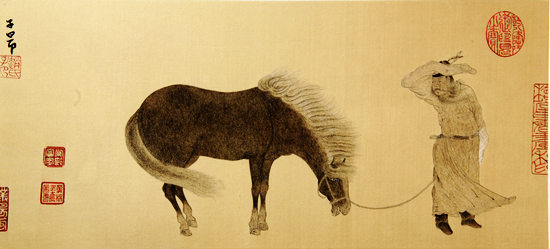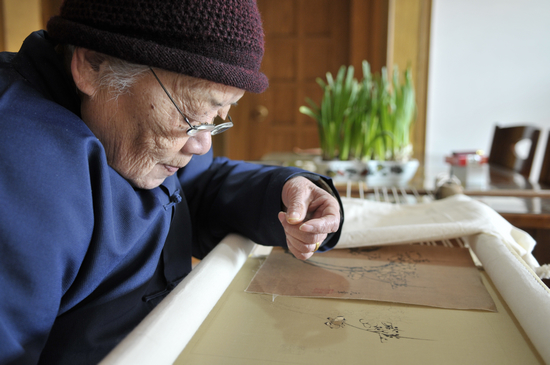Gu Embroidery

History
Gu Embroidery originated from the household of Gu Mingshi in Songjiang, Jiangsu Province. Gu Mingshi was a successful candidate in the highest imperial examination of the Ming Dynasty (1368-1644). In his late years he lived in Shanghai. Almost all the female members in his family would embroider. Thus Gu Embroidery came into being. Among the family members, a woman with the surname Miao and another named Han Ximeng were most skilled at embroidering.
After the death of Gu Mingshi, the living condition of the family began to deteriorate so the Gu embroidery was put onto the market. Initiated by the men of letters such as Dong Qichang in the south of the Yangtze River, some government-run or private embroidery workshop called their products Gu embroidery so as to cultivate the fame.
The silk embroidery of the Gu family style was created earlier than the other four famous embroidery styles (the Su, Ting, Yue, and Shu), which were influenced by Gu Embroidery. It is said that the silk used in Gu Embroidery was thinner than human hair, the lines embroidered were as fine as soft long hair and the match colors were fine and ingenious. The landscape, figures, flowers and birds on the embroidery were all very vivid and favored by both feudal officials and ordinary people.
After the Qing Dynasty (1644-1911), Gu Embroidery was widespread in neighboring areas around Shanghai. Many women tried to imitate the skills; businesspeople opened embroidery workshops and purchased Gu Embroidery works. As a result, Gu Embroidery became famous nationwide. However, after the reign of Jiaqing (1796-1821), Gu Embroidery gradually lost its fame and almost no one mastered the skill. After the founding of new China, this skill regained some development.
Technique

What sets Gu Embroidery apart from other embroidery styles is not just the material selection and stitching techniques, but more importantly, the cultural and artistic accomplishments of the creator. Gu Embroidery is an artwork involving superb techniques, elegant forms and extremely high artistry. It has a far-reaching impact on Su Embroidery, Xiang Embroidery and Shu Embroidery etc.
